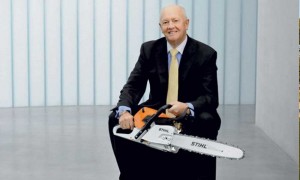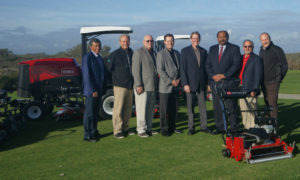Good playing conditions are not created overnight by one person. Good playing conditions are the result of consistent upkeep and management by a dedicated staff, oriented toward a common goal. As the superintendent of Stockton Golf and Country Club, I am the person who is ultimately responsible for everything on the 125 acres that my staff and I care for. I certainly cannot do everything myself, although I tried for a few months when I first arrived. It doesn’t take long to realize that I’m only as good as my staff and they are a reflection of my efforts. Five years later, I’m happy to stand in front of our daily assignment board and see the dedicated individuals that look back at me.
Stockton Golf and Country Club is a private, 18-hole course established in 1914. The original layout was designed by Sam Whiting with renovations by John Harbottle in 1997. The course has fairly tight, tree-lined fairways and small greens. The majority of the property sits below sea level with levees holding back the water on two sides. Just off the first tee, the newly designed clubhouse and the ninth hole are California’s farthest inland port with large ships providing scenery on a regular basis. This can be a great place to work with appreciative and supportive members. I get many more compliments than I deserve when most should go directly to the crew that that makes this place what it is.
I wasn’t always so thrilled with the employees I have to work with. When we all met each other for the first time, the majority of the crew didn’t appear to enjoy their jobs or their co-workers, and they certainly didn’t like their new boss who was as young as some of their children. As the new guy, I brought with me many different ways of caring for a golf course. I tried my best to explain that there are many ways to accomplish the same task and I would like them to try my methods. In response I heard, “That’s not the way we do it.” This attitude persisted until we removed a number of employees from the payroll over the course of a few years. Most of the staff read the writing on the wall and decided to accept some new ways of managing the golf course. Five years later, these same employees are on-board with all of our ideas, both old and new.
Key components
In the past year, I’ve added two people to my staff, and that has made my job and my life much more enjoyable. When my previous assistant left to seek employment back on the east coast, I stumbled on an incredible find. Rob Williams, assistant superintendent of Stockton Golf and Country Club arrived at the course very capable of managing his own property. Since day one, his agronomic sense, managing ability, and love of the sport and industry have greatly improved the golf course. We’ll hold on to him as long as we can, but it seems like a waste when he could be doing much more.
The position of assistant superintendent is a strange one and must be unique when compared to other industry lower-management positions. The wages stink, the hours are borderline ridiculous, and the promise of a promotion is pretty bleak. However, there are still guys like Rob who put in the time and effort to be the best assistant they can in hopes of getting a course of their own. When I talk up Rob’s abilities and his impact on our course to fellow superintendents and industry partners, they often say, “You should keep that quiet and hold on to him.” Someday, I’d hope to have the opposite reputation as a superintendent that churns out managers who go on to succeed at their own courses.
Rob sure is a good starting point for that and I’m sure he will find 18 holes to paint his masterpiece. Until then, we will work together to make Stockton GCC a little better each and every day. Rob, like most good assistants, wants to be involved in every aspect of management. We discuss our strategies for all maintenance operations including irrigation, chemical applications, labor management, budgeting, fertility, and tournament preparation. He is encouraged to bring his own ideas in all areas and he has while accepting criticism and respecting my final decision. The open relationship we maintain has made him better at what he does. After all, if he is not comfortable discussing course management with me, how would he ever debate a topic with a green committee or general manager?
The best part of having an assistant like Rob is that I know the course will be taken care of when I’m stuck in the office, which is way too often. Nobody goes into this profession with the hope of working on Excel, returning emails, and dwelling on budgets. Of course, all that paper work is a big part of the job and somebody needs to manage the course and the staff. We don’t miss a beat with Rob on the grounds and the communication is phenomenal. We are all on the same page. The pro shop, the front office, the maintenance staff, and our equipment manager all know what the other is doing.
The other staff member who has honestly changed my life is our equipment manager, Jan Cariati. The name alone must create interest because, yes, this is the name of a woman. She joined us back in November from a nearby course and among the exhaust fumes, battery terminal cleaner and WD40 has been a breath of fresh air. Jan’s attitude is the main difference between her and every other mechanic I’ve worked with over the years. She starts the day with a smile on her face and is just as positive when the day winds to a close. Everyone who knows what this job entails can understand how remarkable this is. I honestly don’t think I could do the job. It’s just too frustrating.
I knew the crew would be suspicious of a female mechanic. Two weeks in, they were coming to me, individually, and complimenting her work. She has the intellect and background to solve every problem we’ve thrown her way. With some years spent changing brakes and doing tune-ups, a degree in civil engineering from UCLA, several years working with her father maintaining electric boats, and a part-time gig as an electrician there is little that slows her down. Oh, she is also an accomplished musician, a mother of two, and has an aviary and turtle pond in her backyard. All this energy translates to some enthusiasm in the workplace and I can’t get enough of it
Training techniques
Not all employees are natural born superstars like Jan and Rob, but they can be molded into professionals with just a little encouragement. There is nothing revolutionary about the way we teach our employees to be their best. I stick to the tried and true techniques that taught me to be more than a summer employee 15 years ago. These practices worked then and they work now.
First off, we had to get rid of the people that were holding us back. We had to eliminate those employees that did not work well with others, showed up late, called in sick (way too often), and just plain caused problems. Replacing a bad employee with a good employee solves one position, but it also strengthens everyone else on the team. It is hard to do your best and stay motivated when the lazy trouble maker is paid the same as you. Some employees have to pick up the slack, and at the end of the day go home feeling cheated. I’ve been there and when that bad apple finally is shown the door … there is a celebration in the break room.
Consistency on the course has to come from consistency from the management and the crew. I learned this when I was 16 years old working at Morris Park Country Club in South Bend, Ind., for Superintendent Jim Loupee. I walk-mowed the greens one morning and he stopped me when I was washing the unit after finishing my loop. He told me I mowed right-to-left not left-to-right and I would need to go mow all of the greens again. I thought he was kidding. He told me to apologize to the golfers that were playing and explain myself if needed. The members got a real kick out it, and I never mowed the wrong direction again, at least not the whole loop.
The “do it again” approach works so well, it is probably the best training technique we employ. If the bunkers are raked wrong, go do them all again. If the tees are not cleaned properly, go check them all again. It wastes some productivity for one day, but the employee is unlikely to make that mistake for a second time. Nobody likes to do the same job twice in a row.
A more positive side of encouragement was also discovered at Morris Park during my summer breaks. An older gentleman named Mickey would always pump his fist when he drove by a fellow employee working on the course. Our group of high school kids would laugh about Mickey’s enthusiasm, but it started to catch on. Eventually, the whole crew was cheering each other on with this simple fist pump, wave, or thumbs up. It may be silly, but I’ve brought this to every course I’ve worked at. Some members have told me they enjoy the way we cheer each other on and it helps to build some unity and a team atmosphere. However, be warned, it can be dangerous. Just last year, one of our rough operators (we’ll call him Abel) drove into a tree while pumping his fist to Ricardo who was mowing fairways. Abel smashed the left deck of a John Deere 3245C for a repair bill of nearly $1,000. Yes, Abel still works here, but he’ll never stop hearing about that day.
As the crew starts to show dependability and quality workmanship, we begin to transition more authority to their shoulders. Mario now leads nearly all landscape installation, upkeep, and plantings with a crew assigned to him and very little input from the bosses besides, “nice job.” Richard handles large irrigation and drainage projects even though he only knew how to raise heads two years ago. Sal and Arnold have supervised carpentry work in the remodel of a restroom and some new walk paths for the tees. This is the type of motivation that keeps crew members happily employed year after year. We all know that these jobs don’t pay as well as they should, so money cannot be the major motivation.
Each year, Stockton Golf and Country Club gets a little easier to manage. The turf is a little healthier and so is the equipment inventory, but that’s only a fraction of the story. The main reason we can do so much more is this staff that keeps improving along with the golf course. To all of them, thank you.
Jim Alwine is superintendent at Stockton Golf and Country Club in Stockton, Calif. Check out his blog at http://sgccturf.blogspot.com/ or he can be reached at sgccturf@sbcglobal.net.




















